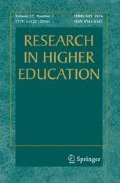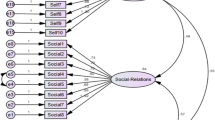Abstract
This study presents an empirical test of the impact of English proficiency as indicated by student self-ratings and TOEFL scores, and selected nonlinguistic variables on the level of academic difficulties perceived by international graduate students. A simple random sample of 450 international graduate students from three large universities in upstate New York were contacted by mail in the fall of 1988. With two mailings, 245 completed the Survey of International Students' Academic Language Needs. It was found that Self-rated English Proficiency was the most significant predictor of the perceived level of academic difficulty. In addition, Length of Prior English Training and Age were also significant predictors. TOEFL score was found to be a nonsignificant predictor of students' academic difficulty. Implications of the research for English-language educators, ESL program and curriculum design, and U.S. university recruitment policy on international students were discussed.
Similar content being viewed by others
References
Boyer, S. P., and Sedlacek, W. E. (1986).Attitudes and Perceptions of Incoming International Students. ERIC Document Reproduction Service No. ED278935.
Burgess, T. C., and Greis, N. B. (1970).English Language Proficiency and Academic Achievement Among Students of English as a Second Language at the College Level. Eric Document Reproduction Service No. ED 074 812.
Chapman, D., Wan, T. Y., and Xu, M. (1988). Academic adjustment of international students in American universities.Education and Research 6(2): 96–103.
Hargett, Gary R., and Olswang, Steven G. (1984). An institutional approach to improving the English proficiency of foreign students: The modified transitional model.American Language Journal 2(1): 67–83.
Heikinheimo, P. S., and Shute, J. C. M. (1986). The adaptation of foreign students: Student view and institutional implications.Journal of College Student Personnel 27(50): 399–406.
Heil, D. K., and Aleamoni, L. M. (1974).Assessment of the Proficiency in the Use and Understanding of English by Foreign Students as Measured by the Test of English as a Foreign Language. ERIC Document Reproduction Service No. ED 039948.
Ho, D. Y. F., and Spinks, S. (1985). Multivariate prediction of academic performance by Hong Kong University students.Contemporary Educational Psychology 10: 249–259.
Hwang, K., and Dizney, H. F. (1970). Predictive validity of the test of English as a foreign language for Chinese students at American University.Educational and Psychological Measurement 30: 475–477.
Institute of International Education (1987).Open Doors: 1986–1987 Report on International Education Exchange. New York.
Light, R. L., Xu, M., and Mossop, J. (1987). Relationship between English proficiency and academic performance of international students.TESOL Quarterly 21(2): 251–261.
Meloni, C. F. (1986).Adjustment Problems of Foreign Students in U.S. Colleges and Universities. ERIC Document Reproduction Service No. ED 276 296.
Mestre, J. P. (1981). Predicting academic achievement among bilingual Hispanic college technical students.Educational and Psychological Measurement 41: 1255–1264.
Mulligan, A. C. (1966). Evaluating foreign credentials.College and University 41: 307–313.
Reinick, M. J. (1986).Cultural Adjustment of International Students in the U.S. A Reevaluation Using Reformulated Learned Helplessness. ERIC Document Reproduction Service No. ED 274939.
Sharon, A. T. (1972). English proficiency, verbal aptitude and foreign students' success in American graduate schools.Educational and Psychological Measurement 32: 425–434.
Spaulding, S., and Flack, M. (1976).The World's Students in the United States: A Review and Evaluation of Research on Foreign Students. New York: Praeger.
Strover, A. D. (1982). Effects of language admission criteria on academic performance of non-native English speaking students.Dissertation Abstract International 42: 4374A-4375A. University Microfilm No. 67-8032.
Watslawick, P. (ed.) (1984).The Intended Reality: Constructions to Constructivism. New York: Norton.
Xu, M., and Wan, T. Y. (1988). Validation of alternative criterion and predictive variables in the evaluation of international students' academic performance.Proceedings of 1988 Edward F. Kelly Evaluation Conference, University of Albany, the State University of New York, Albany, New York. pp. 25–31.
Author information
Authors and Affiliations
Rights and permissions
About this article
Cite this article
Xu, M. The impact of English-language proficiency on international graduate students' perceived academic difficulty. Res High Educ 32, 557–570 (1991). https://doi.org/10.1007/BF00992628
Received:
Issue Date:
DOI: https://doi.org/10.1007/BF00992628




